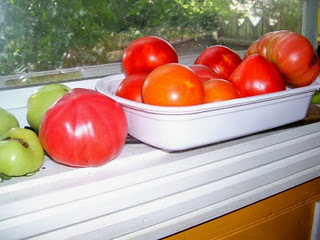“We prefer to buy the same items as the proletariat — it’s just that we buy rarefied versions of these items that members of the working class would consider preposterous…We’ll buy potatoes, but we won’t buy an Idaho spud. We’ll select one of those miniature potatoes of distinction that grow only in certain soils of northern France. When we need lettuce, we will choose only from among those flimsy cognoscenti lettuces that taste so bad on sandwiches. The beauty of such a strategy is that it allows us to be egalitarian and pretentious at the same time.”
–David Brooks, Bobos In Paradise: The New Upper Class and How They Got There
Ace has been advocating slow food, small food, farmer-as-rockstar, farm-to-table, and eating locally since 1989 (see also: vintage Ace tote at left from more than a decade ago), and by and large, it’s been a sheer delight to watch the bandwagon gather steam. We were printing Open Letters from Barbara Kingsolver long before she spent a year eating locally and wrote Animal, Vegetable, Miracle: A Year of Food Life (P.S.). “Best restaurant for Locavores” was an Ace Best of Lex category long before it was selected the 2007 “word of the year.”
Still, every so often, the Movement hits moments of unintended irony, as with yesterday’s Wall Street Journal report, Sotheby’s Puts Veggies on the Block.
Sotheby’s New York will host a September 23, 2010 benefit and auction called, The Art of Farming, where the heirlooms on the block will be heirloom vegetables. As WSJ reports,
“these aren’t your average garden greens. On the auction block are mixed crates filled with veggies such as Turkish Orange Eggplant, Lady Godiva Squash and Pink Banana Pumpkin. Rare, indeed. The asking price: $1,000 a crate.” [emphasis added, along with “air quotes.”]
 |
| Local Tomatoes grown by Ace food writer Tom Yates. Do we hear $1500? |
The Auction will benefit worthy causes like GrowNYC and The Sylvia Center — which resemble some of our own worthy local initiatives like SustainLex , Seedleaf and more recent sprouts like InFeed.
For a thousand bucks a box though, farmers around here might have to throw in a few samples of Kentucky’s actual number one cash crop.
“Not your average garden greens?” Indeed.








